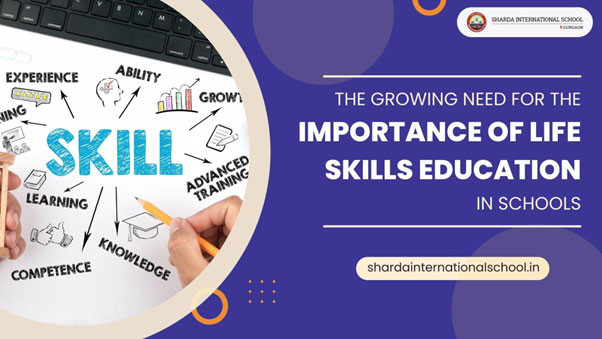The Growing Need for the Importance of Life Skills Education in
Schools
 You know that moment when you finally step out of school, diploma
in hand, ready to take on the world… and then it hits you? You
have no idea how to do your taxes, manage your time effectively,
or even handle a tough conversation without it turning into a
full-blown argument.
You know that moment when you finally step out of school, diploma
in hand, ready to take on the world… and then it hits you? You
have no idea how to do your taxes, manage your time effectively,
or even handle a tough conversation without it turning into a
full-blown argument.
That’s the reality for a lot of students today. They leave school
knowing how to solve for X and write a five-paragraph essay, but
when it comes to real-world challenges? They’re often left
scrambling. That’s why the importance of life skills education has
never been greater. It’s not just a nice addition to school
curriculums—it’s essential.
What Are Life Skills, and Why Do They Matter?
Life skills are exactly what they sound like: the skills that make
life easier, smoother, and just a little less chaotic. We’re
talking about things like communication, problem-solving, time
management, decision-making, and emotional intelligence.
Think about it—knowing how to calculate the area of a triangle is
great, but knowing how to budget your money? That’s a skill that
will serve you every single day. Being able to analyze
Shakespeare’s sonnets is cool, but being able to express yourself
clearly in a job interview? That’s what truly makes a difference.
The importance of life skills education isn’t just about preparing
kids for adulthood—it’s about making sure they can thrive in every
aspect of life, from their personal relationships to their
professional careers.
Why Schools Need to Prioritize Life Skills Right Now
The world is changing fast. Like, really fast. The job market is
evolving, technology is reshaping industries, and mental health
concerns are more prevalent than ever. If we want students to
succeed, we can’t just hand them a diploma and hope for the best.
They need the tools to navigate a world that doesn’t come with a
step-by-step guide.
Take stress management, for example. Anxiety and burnout aren’t
just adult problems anymore—kids are dealing with overwhelming
pressure from school, social media, and expectations that seem
impossible to meet. Teaching them how to cope with stress,
regulate emotions, and set healthy boundaries? That’s just as
important as teaching them algebra.
And let’s not forget financial literacy. Schools expect students
to function as independent adults the moment they graduate, yet
most of them have no clue how to manage money. They don’t
understand credit scores, interest rates, or how to avoid debt
traps. The importance of life skills education in this area alone
is massive.
Soft Skills Are Just as Important as Academics
The idea that success is purely academic is outdated. Employers
today don’t just want someone with a degree; they want someone who
can work in a team, communicate effectively, adapt to change, and
think critically.
Imagine a brilliant software engineer who can code like a wizard
but can’t collaborate with their colleagues. Or a doctor who knows
everything about medicine but lacks empathy for their patients.
Technical skills might land you a job, but soft skills determine
how far you go.
That’s where the importance of life skills education becomes
clear. It’s about creating well-rounded individuals who can handle
pressure, resolve conflicts, and navigate life’s unpredictability
with confidence.
Real-Life Learning Beats Memorization Any Day
Traditional education has been all about memorization. You study,
you take a test, you forget half of what you learned within a
month. But real learning? That happens when students engage,
experience, and apply what they learn in meaningful ways.
What if instead of just talking about leadership, schools let
students run projects? What if instead of just teaching
theoretical decision-making, students practiced making tough
choices in real-world scenarios? When kids get hands-on
experience, those lessons stick.
The importance of life skills education lies in its ability to
make learning practical. Schools that incorporate interactive
teaching methods—debates, role-playing, community projects—prepare
students in a way that textbooks simply can’t.
Mental Health, Confidence, and a Sense of Purpose
It’s no secret that stress, anxiety, and self-doubt are major
issues for students. The world constantly tells them to be
more—achieve more, score higher, work harder. But rarely are they
taught how to handle the pressure.
Importance of Life Skills Education education helps bridge that
gap. Teaching kids about resilience, emotional intelligence, and
self-awareness gives them the confidence to face challenges
without feeling like they’re drowning. Knowing how to manage
emotions, handle failure, and bounce back from setbacks isn’t just
helpful—it’s life-changing.
And here’s something else: a sense of purpose. When students learn
practical skills that make them feel capable, they become more
motivated. They start to see education as something that actually
applies to their lives, rather than just a series of exams they
need to pass.
Parents and Schools: A Team Effort
While schools play a huge role in shaping students, parents are
just as important. The lessons kids learn in the classroom need to
be reinforced at home. Financial literacy can start with an
allowance. Responsibility can be taught through chores. Emotional
intelligence can be nurtured through open conversations.
When schools and parents work together, the impact and Importance
of Life Skills Education multiplies. Kids grow up with a solid
foundation, prepared not just for tests, but for life itself.
The Bottom Line
The world isn’t slowing down, and neither should education. It’s
time schools recognize that academics alone aren’t enough. The
importance of life skills education goes beyond grades—it’s about
giving students the knowledge, confidence, and resilience they
need to build a successful, fulfilling future.
And that’s exactly what Sharda International School the
Best Schools in Gurgaon
is committed to. Because real education isn’t just about preparing
kids for exams—it’s about preparing them for life.